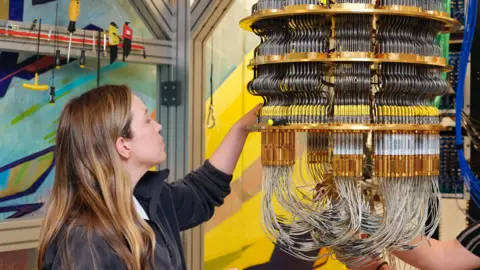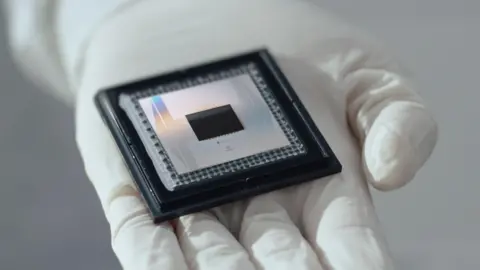Know-how Reporter
 Google
GoogleTwenty 5 years in the past pc programmers had been racing to repair the millennium bug amidst fears that it could trigger banking programs to crash and planes to fall out of the sky.
A lot to everybody’s aid the impact turned out to be minimal.
At this time, some concern there’s a new important menace to the world’s digital infrastructure. However this time, we can not predict precisely when it can transfer from principle to actuality, whereas the ubiquity of digital expertise means fixing the issue is much more difficult.
That’s as a result of the arrival of quantum computing implies that most of the encryption algorithms that underpin and safe our hyperconnected world will likely be trivially straightforward to crack.
Quantum computing is radically completely different to the “classical” computing used at the moment. As an alternative of processing binary bits which exist in one in every of two states – one or zero, on or off – quantum computing makes use of qubits, which may exist in a number of states, or superpositions.
“The explanation why it is so highly effective is since you’re doing all these doable computations concurrently,” Prof Nishanth Sastry, director of analysis for pc science on the College of Surrey, explains. This implies it is “a lot, way more environment friendly, a lot, way more highly effective.”
This implies quantum programs supply the potential for fixing key issues which can be past classical computer systems, is areas corresponding to medical analysis and supplies science, or cracking significantly advanced mathematical issues.
The issue is a few of those self same mathematical issues underpin the encryption algorithms that assist to make sure belief, confidentiality and privateness throughout at the moment’s pc networks.
At this time’s computer systems would take hundreds, even hundreds of thousands of years, to crack present encryption requirements, corresponding to RSA. A suitably highly effective quantum pc may, theoretically, do the job in minutes.
This has implications for every thing from digital funds and ecommerce to satellite tv for pc communications. “Something that is protected by one thing that is weak turns into honest sport for those that have entry to quantum related computer systems,” says Jon France, chief data safety officer at non-profit cybersecurity group ISC2.
Quantum computer systems able to breaking uneven encryption are regarded as years away.
However progress is being made.
In December, Google said its new quantum chip incorporates key “breakthroughs” and “paves the way in which to a helpful, large-scale quantum pc”.
Some estimates say a quantum system able to breaking present encryption would require 10,000 qubits, whereas others say hundreds of thousands could be wanted. At this time’s programs have just a few hundred at most.
However companies and governments face an issue proper now, as attackers may harvest encrypted data and decrypt it later after they do achieve entry to suitably highly effective units.
 Google
GoogleGreg Wetmore, vp for software program improvement at safety agency Entrust, says if such units may emerge within the subsequent decade, expertise leaders must ask, “What knowledge in your group is effective for that time period?”
That may very well be nationwide safety data, private knowledge, strategic plans, and mental property and secrets and techniques – consider a comfortable drink firm’s “secret” formulation or the exact steadiness of herbs and spices in a quick meals recipe.
Mr France provides, if quantum computing turns into widespread, the menace turns into extra quick with the encryption that protects our day by day banking transactions, for instance, probably trivial to interrupt.
The excellent news is that researchers and the expertise trade have been engaged on options to the issue. In August, the Nationwide Institute of Requirements and Know-how within the US launched three put up quantum encryption requirements.
The company stated these would “safe a variety of digital data, from confidential e-mail messages to e-commerce transactions that propel the trendy economic system.” It’s encouraging pc system directors to transition to the brand new requirements as quickly as doable, and stated an additional 18 algorithms are being evaluated as backup requirements.
 Getty Photographs
Getty PhotographsThe issue is this implies an enormous improve course of touching nearly all our expertise infrastructure.
“If you consider the variety of issues on the market with uneven encryption in them, it is billions of issues. We’re going through a extremely massive change drawback,” says Mr France.
Some digital infrastructure will likely be comparatively straightforward to improve. Your browser, for instance, will merely obtain an replace from the seller says Mr France. “The problem actually is available in discrete units and the web of issues (IOT),” he continues.
These is likely to be laborious to trace down, and geographically inaccessible. Some gear – legacy units in important nationwide infrastructure corresponding to water programs, for instance – won’t be highly effective sufficient to deal with the brand new encryption requirements.
Mr Wetmore says the trade has managed encryption transitions previously, however “It is the sharper discontinuity that makes this menace extra severe.”
So, it’s attempting to assist clients construct “crypto agility” by setting out insurance policies now and utilizing automation to establish and handle their cryptographic belongings. “That is the key to creating this transition an orderly one and never a chaotic one.”
And the problem extends into area. Prof Sastry says many satellites – such because the Starlink community – ought to be comparatively easy to improve, even when it means briefly taking a person system offline briefly.
“At any given cut-off date, particularly with the LEO (low earth orbit) satellites, you have received 10 to twenty satellites above your head,” Prof Sastry says. “So, if one cannot serve you, nicely so what? There are 9 others that may serve you.”
Tougher, he says, are “distant sensing” satellites, which embody these used for geographical or intelligence functions. These carry much more compute energy on board and sometimes embody some type of safe computing module. A {hardware} improve successfully means changing the entire system. Nonetheless, says Prof Sastry, that is now much less of an issue because of extra frequent and decrease price satellite tv for pc launches.
Whereas the impression of the millennium bug might need been minimal within the first days of 2000, that is as a result of an immense quantity of labor had gone into fixing it forward of a identified deadline, says François Dupressoir, affiliate professor in cryptography on the College of Bristol.
Against this, he provides, that it’s not doable to foretell when present encryption will turn out to be weak.
“With cryptography,” says Mr Dupressoir “If anyone breaks your system, you’ll solely know as soon as they have your knowledge.”



